Strategic Thought Transformation - The IIPM Think Tank
Strategic Thought Transformation - The IIPM Think Tank
Strategic Thought Transformation - The IIPM Think Tank
You also want an ePaper? Increase the reach of your titles
YUMPU automatically turns print PDFs into web optimized ePapers that Google loves.
I N T A N G I B I L I T Y<br />
Kim Warren<br />
Teaching Fellow<br />
<strong>Strategic</strong> and International Management<br />
London Business School<br />
<strong>The</strong>re has been considerable interest<br />
in recent years in the role that<br />
intangible factors, such as reputation,<br />
staff skills, and business relationships,<br />
play in the strategy and performance of<br />
commercial organisations. Executives fully<br />
understand the importance of sustaining<br />
these vital factors, and academics have devoted<br />
much effort to understanding how<br />
they operate.<br />
Lately, though, investors have also taken<br />
an increasing interest in intangibles, and<br />
regulators in both Europe and the US have<br />
also turned their attention to the issue. Underlying<br />
this interest is a concern that management,<br />
in an effort to deliver shareholder<br />
expectations, may inadvertently damage<br />
commercial fundamentals on which future<br />
prospects of the business rely.<br />
<strong>The</strong> EU has published guidelines on the<br />
subject. And, in the UK, regulation is seemingly<br />
imminent after a consultation period.<br />
Us reporting requirements are heading in<br />
a similar direction.<br />
<strong>The</strong> consultation document on the Operating<br />
and Financial Review and Directors’<br />
Report (OFR), published by the UK’s Department<br />
of Trade and Industry, observes:<br />
“Company accounting and reporting remains<br />
essentially backward looking and<br />
based on financial indicators. <strong>The</strong>re are<br />
few statutory requirements to report on<br />
the main qualitative factors which underlie<br />
past and future performance (or for future<br />
performance, even financial factors) – in<br />
particular on strategy, prospects, opportunities<br />
and risks; on intangible, and so-called<br />
‘soft’, assets (which may contribute significantly<br />
to success but are not well captured<br />
in traditional financial statements); and on<br />
key business and wider relationships. As a<br />
result, the information provided is defective<br />
and directors do not have the discipline of<br />
accounting for stewardship on some key<br />
responsibilities.”<br />
Moves to regulate the reporting of<br />
intangibles raise a fundamental question<br />
– would investors know what to make<br />
of information about intangible factors<br />
if it were provided Managers with considerable<br />
experience of actually runnng<br />
a business find it hard enough to understand<br />
how intangibles impact on future<br />
performance. It is difficult to see how<br />
outsiders will be able to make sense of<br />
them. It is perhaps not surprising, then,<br />
that responses to the draft UK regulations<br />
suggest that boards and their advisors are<br />
uncertain as to how exactly to comply with<br />
the requirements.<br />
Intangible shopping<br />
Consider the history of investor expectations<br />
and performance of the iconic British<br />
retailer Marks & Spencer (M&S). Few<br />
businesses are as open about intangible<br />
factors affecting their performance, or as<br />
studied by analysts and commentators.<br />
Yet the recent years have been a rollercoaster<br />
of overblown expectations, major<br />
disappointments, hoped-for recovery, and<br />
agonising progress.<br />
Surely, if management and investors<br />
shared a good understanding of how M&S<br />
performance depended on well-known intangibles,<br />
little of this confusion and angst<br />
should have occurred<br />
In 1998 profits were £1.1 billion, with analysts<br />
expecting more of the same in 1999,<br />
in spite of well-known information that the<br />
company’s reputation for quality, service,<br />
and value had been in steady decline since<br />
the early 1990s. Recovery was expected<br />
in both 2000 and 2001, even though the<br />
spotlight was firmly fixed on these continuing<br />
poor intangibles. So why were investors<br />
surprised when this recovery failed to<br />
materialise More recent years have seen<br />
desperate efforts by M&S to keep delivering<br />
profitability, while at the same time trying<br />
to fix a system that has been badly, and<br />
to a large degree, irreparably damaged.<br />
<strong>The</strong>re is simply no way to reconstruct the<br />
extraordinary loyalty of the huge core customer<br />
segment M&S once enjoyed, and replacement<br />
business will inevitably be more<br />
fragile and costly to sustain.<br />
In spite of excellent information and<br />
scrutiny of intangibles, investors clearly<br />
had only a flimsy understanding of the<br />
implications for M&S’s sustainable future<br />
earnings. What management and investors<br />
alike require, then, is a logical, rigorous,<br />
and reliable means of connecting information<br />
about intangible factors to the strategy<br />
An <strong>IIPM</strong> Intelligence Unit Publication STRATEGIC INNOVATORS 53



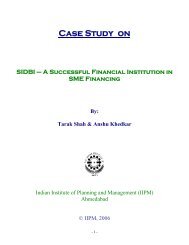
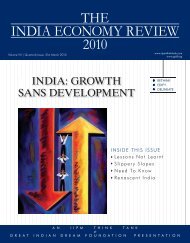
![[Feb 2008, Volume V Annual Issue] Pdf File size - The IIPM Think Tank](https://img.yumpu.com/43961117/1/190x245/feb-2008-volume-v-annual-issue-pdf-file-size-the-iipm-think-tank.jpg?quality=85)
![[June 2008, Volume V Quarterly Issue] Pdf File size - The IIPM Think ...](https://img.yumpu.com/41693247/1/190x245/june-2008-volume-v-quarterly-issue-pdf-file-size-the-iipm-think-.jpg?quality=85)

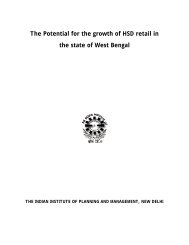
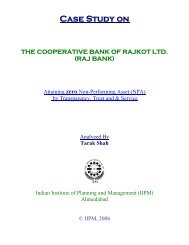

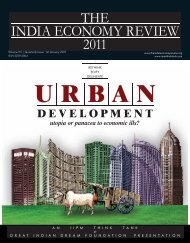
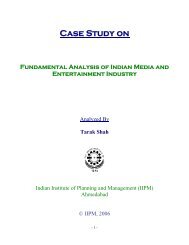
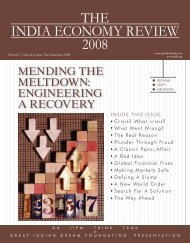
![[Dec 2007, Volume 4 Quarterly Issue] Pdf File size - The IIPM Think ...](https://img.yumpu.com/29766298/1/190x245/dec-2007-volume-4-quarterly-issue-pdf-file-size-the-iipm-think-.jpg?quality=85)
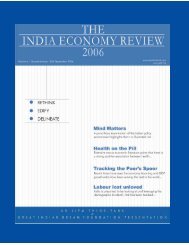
![[Volume VI | Quarterly Issue: 31st May 2009] Pdf File size](https://img.yumpu.com/27796051/1/190x245/volume-vi-quarterly-issue-31st-may-2009-pdf-file-size.jpg?quality=85)